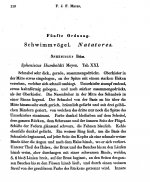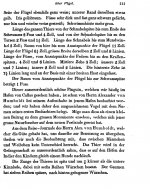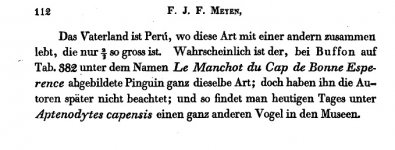Björn Bergenholtz
(former alias "Calalp")

I think there is little doubt that the Humboldt Penguin Spheniscus humboldti MEYEN 1834 (a k a "Peruvian Penguin") commemorate the well-known German aristocrat, scientist and famous explorer Baron Friedrich Wilhelm Heinrich Alexander von Humboldt (1769–1859).
Now I´m only looking for a "good quote" that verifies this, and hopefully adds something "fun" to read ...
The type description of this Penguin, by the German ornithologist Franz Meyen, was published in 1834, in: Beiträge zur Zoologie, gesammelt auf einer Reise um die Erde. Vierte abhandlung: Vögel. Verhandlungen der Kaiserlichen Leopoldinisch-Carolinischen Akademie der Natur-Forsher/Novorum Actorum Academia Caesarea Leopoldino-Carolinae Naturae Curisorum (8, suppl. 1) 16: 59-124 (Attached pp. 110-112; "Spheniscus Humboldti").
In this text Herr (Mr.) Meyen writes (and it does, from what I understand of German, looks like a truly good quote):
Anyone of our German knowing friends "out there" feel like having a go?
And is there anything more in this text, not to miss, regarding Mr. Humboldt and this, "his" Penguin?
Now I´m only looking for a "good quote" that verifies this, and hopefully adds something "fun" to read ...
The type description of this Penguin, by the German ornithologist Franz Meyen, was published in 1834, in: Beiträge zur Zoologie, gesammelt auf einer Reise um die Erde. Vierte abhandlung: Vögel. Verhandlungen der Kaiserlichen Leopoldinisch-Carolinischen Akademie der Natur-Forsher/Novorum Actorum Academia Caesarea Leopoldino-Carolinae Naturae Curisorum (8, suppl. 1) 16: 59-124 (Attached pp. 110-112; "Spheniscus Humboldti").
In this text Herr (Mr.) Meyen writes (and it does, from what I understand of German, looks like a truly good quote):
With only limited knowledge of German I hope that anyone of Bird Forums readers feel like translating this quote for me!? If so, please as accurate as possible, as I would like to quote it myself in Swedish. And don´t hesitate to remark on any errors that I might have done transcribing it."Dieser ausserordentlich schöne Pinguin, welchen wir häufig im Hafen von Callao gesehen haben, ist schon von Herrn Alexander von Humboldt bei seinem Aufenthalte in jenem Hafen beobachtet worden; und wir haben daher den ausgezeichneten Vogel mit dem Namen seines ersten Beobachters belegt. Möge man diess als einen kleinen Beitrag zu dem grossen Monumente ansehen, welches sich jener grosse Naturforscher auf dem neuen Festlande gesetzt hat.
Auf dem Reise-Journale des Herrn Alex. von Humboldt, welcher die Güt gehabt hat, uns dasselbe zur Benutzung zu übergeben, theilen wir noch die Beobachtung mit, dass zwischen Männchen und Weibchen kein Unterschied herrscht. Das Thier wird in der Gefangschaft so ausserordentlich zahm, dass es auf den Höfen der Indier den Kindern gleich einem Hunde nachläuft."
Anyone of our German knowing friends "out there" feel like having a go?
And is there anything more in this text, not to miss, regarding Mr. Humboldt and this, "his" Penguin?







